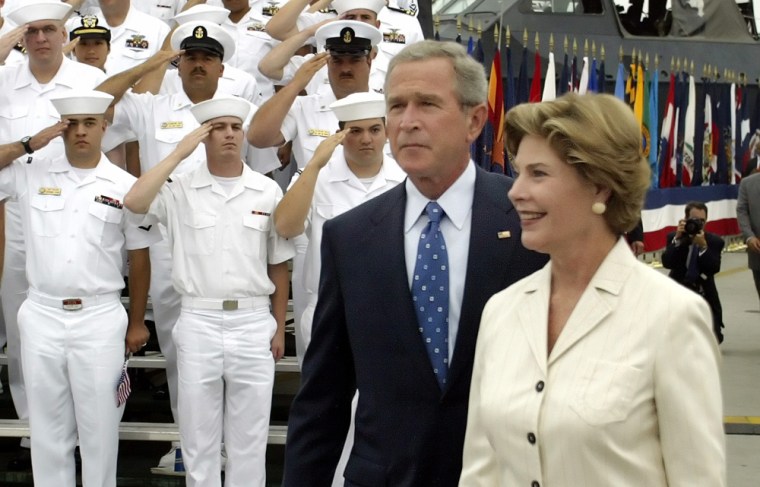President Bush will cut short a month-long vacation at his Texas ranch to return to Washington Wednesday to help oversee a massive recovery effort from Hurricane Katrina, the White House said.
"Right now, our priority is on saving lives, and we are still in the midst of search-and-rescue operations," Bush said before addressing Navy sailors, Marines and veterans in San Diego.
"The federal, state and local governments are working side by side to do all we can to help people get back on their feet, and we have got a lot of work to do," he added.
Bush had been scheduled to return to Washington on Friday, but White House spokesman Scott McClellan said the president decided to return earlier because of the hurricane. Hundreds are feared dead in Mississippi as a result of the storm, and floodwaters have poured into low-lying New Orleans.
"The president's preference is to manage the response efforts from Washington," McClellan said.
Massive mobilization
In Washington, U.S. officials launched what they called "one of the largest disaster-response mobilizations in United States history." Hundreds of government trucks, Coast Guard aircraft and search and rescue teams were dispatched to the four worst hit states -- Mississippi, Louisiana, Alabama and Florida.
Once back in Washington, McClellan said, Bush would lead an interagency conference call in the afternoon. He was expected to visit the devastated region later in the week.
Bush already has approved disaster declarations for all or parts of the four states to help them get government aid. Risk analysts estimated the storm, which struck Monday, would cost insurers $26 billion, the most in U.S. history.
At the Defense Department, spokesman Bryan Whitman said a total of 7,503 Army and Air Force National Guard troops had been ordered to duty by governors in their home states of Louisiana, Mississippi, Alabama and Florida to provide aid ranging from law enforcement and debris removal to medical care, power generators, ice and water.
Army engineers, others standing by
Whitman said the Army Corps of Engineers and other active-duty military units were also prepared to provide any help requested by the Federal Emergency Management Agency and that cooperation was being coordinated through the U.S. military's Northern Command in Colorado Springs, Colorado.
"Logistics and assessment teams are out and deployed in all four states and doing response planning in all of those areas," Whitman added.
While thousands of National Guard members from the four states are currently serving on active military duty in Iraq and elsewhere, Whitman said he saw no evidence that the governors did not have enough National Guard troops to provide adequate help.
"The numbers would suggest otherwise," he said, adding that a total of 31,740 National Guard troops were available for duty in the four states.
The Department of Homeland Security said the hurricane had proved to be "one of the most dangerous storms in U.S. history" and urged citizens to follow rescuers' instructions. It said it had deployed 23 disaster medical-assistance teams, 40 Coast Guard aircraft, 30 boats, 390 trucks to deliver supplies and dozens of trained relief and public-service workers.
Bush said, "This is a trying time for the people of these communities. We know that many are anxious to return to their homes. It's not possible at this moment."
